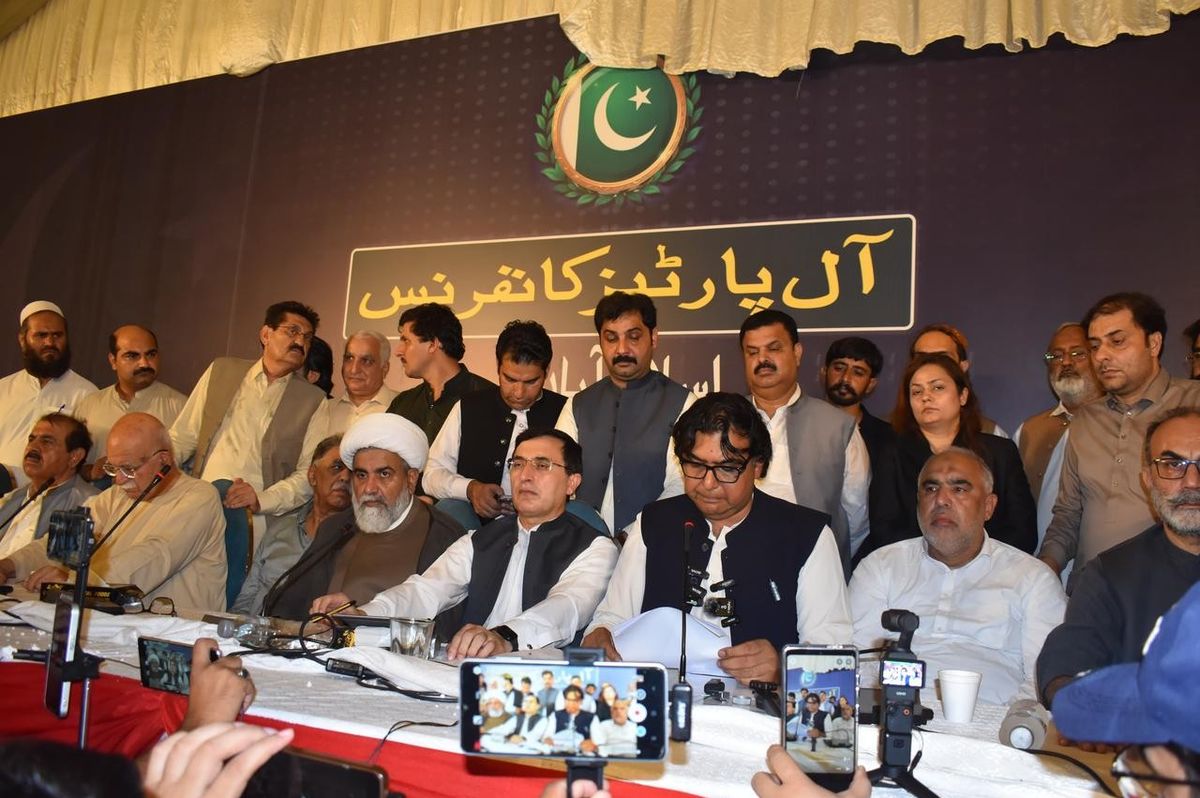Pakistan’s opposition calls for democratic reforms, rejects 2024 polls as 'illegitimate'
At a two-day APC in Islamabad, parties also sought to repeal of the 26th Amendment and called for a national inquiry into 'power abuses'

Javed Hussain
Correspondent
I have almost 20 years of experience in print, radio, and TV media. I started my career with "Daily Jang" after which I got the opportunity to work in FM 103, Radio Pakistan, News One, Ab Tak News, Dawn News TV, Dunya News, 92 News and regional channels Rohi TV, Apna Channel and Sach TV where I worked and gained experience in different areas of all three mediums. My journey from reporting to news anchor in these organisations was excellent. Now, I am working as a correspondent with Nukta in Islamabad, where I get the opportunity of in-depth journalism and storytelling while I am now covering parliamentary affairs, politics, and technology.

A two-day All Parties Conference concluded in Islamabad on Friday.
Nukta
An opposition-led All Parties Conference (APC) in Pakistan’s capital Islamabad issued a sweeping declaration rejecting Pakistan’s current political order and the legitimacy of the 2024 general elections.
Organized by the Movement for the Protection of the Constitution — an emerging alliance pushing for democratic revival, judicial independence, and civilian supremacy — the two-day summit concluded on Friday with a call for a South Africa-style Truth and Reconciliation Commission to address decades of constitutional violations and political repression.
Bringing together a wide range of opposition parties, including the Pakistan Tehreek-e-Insaf (PTI), the conference warned of an “unprecedented constitutional, political, and economic crisis” gripping the country.
Key demands included repealing the 26th Constitutional Amendment, which participants described as undermining judicial autonomy, and establishing a national inquiry into historical abuses of power.
Mounting political and judicial discontent
The joint declaration took particular aim at the judiciary’s alleged eroding autonomy. Referring to the explosive letter penned earlier this year by six sitting judges of the Islamabad High Court, the conference called it “the voice of the nation” and strongly condemned retaliatory measures against the judges. The participants rejected the 2024 elections and their outcome in totality, terming the electoral process an “insult to democracy.”
The declaration further asserted that the country’s institutions had lost public trust, claiming that parliament’s authority had been reduced to symbolic status and that the judiciary was no longer independent. According to the conference, restoring the true supremacy of the Constitution was the only path forward — a goal they pledged to pursue regardless of the obstacles.
Economic breakdown and regional grievances
The conference also painted a bleak picture of Pakistan’s economic conditions. The poverty rate, it said, had surged to 45%, while the purchasing power of the middle class had dropped by 58%. Unemployment was pegged at 22%, with youth unemployment exceeding 30%. These statistics, participants argued, were not merely numbers but proof of a system in freefall.
Special focus was given to grievances from Balochistan, Khyber Pakhtunkhwa, and the erstwhile tribal areas (FATA). The APC demanded that all missing persons be immediately produced in court, extrajudicial killings cease, and political prisoners — including activist Mahrang Baloch — be released without delay.
In a broader demand for justice, the APC condemned the use of the Counter-Terrorism Department (CTD) for politically motivated detentions and called for an end to what it described as systemic suppression of dissent in these regions.
Revisiting the Charter of Democracy
The opposition alliance accused the ruling parties of violating the very Charter of Democracy they once championed. The APC reiterated its call for a Truth and Reconciliation Commission, modeled after post-apartheid South Africa, to provide a platform for voluntary confessions and accountability for all those - past and present - who had undermined the Constitution or abused state power.
“The time has come,” the declaration read, “for everyone — civilian or military — who trampled on the constitutional rights of the people to come forward, admit their mistakes, and face the truth.”
Federation under strain
The declaration also addressed growing tensions within Pakistan’s federal structure. Stressing that Pakistan is a voluntary federation where all units are constitutionally equal, the participants highlighted the need for genuine power-sharing. They warned against what they viewed as exploitative policies, particularly concerning resource extraction in Balochistan, Khyber Pakhtunkhwa, and Gilgit-Baltistan, and rejected any legislation or contracts related to local minerals signed without the consent of the local population.
The conference called for full implementation of the National Finance Commission (NFC) award, especially the promised increase in Khyber Pakhtunkhwa’s post-merger share from 14% to 19%, which remains unfulfilled.
Legacy of conflict and demands for justice
Highlighting the ongoing turmoil in Khyber Pakhtunkhwa and former FATA regions, the APC condemned the continued enforcement of the “Action in Adversarial Power Regulation,” which was earlier declared unconstitutional by the Peshawar High Court but later suspended by the Supreme Court. The opposition alliance urged the provincial government to withdraw its appeal, thereby restoring the High Court’s ruling.
In addition, the APC expressed solidarity with the tribal population, praising their ongoing peaceful struggle for security and civil rights. The declaration demanded not only the recognition of their rights to natural resources but also a role in shaping cross-border trade policies that directly impact their livelihoods.
Administrative obstruction and final words
In a final rebuke, participants condemned the Islamabad administration’s cancellation of the venue booking for the APC, calling it a blatant violation of constitutional and legal rights. Despite the setback, the conference proceeded, and its leaders vowed to continue the campaign to restore constitutional supremacy.
“The Constitution is not a document of convenience,” the declaration concluded, “but a covenant between the state and its people. Our struggle to uphold it will not stop here.”










Comments
See what people are discussing